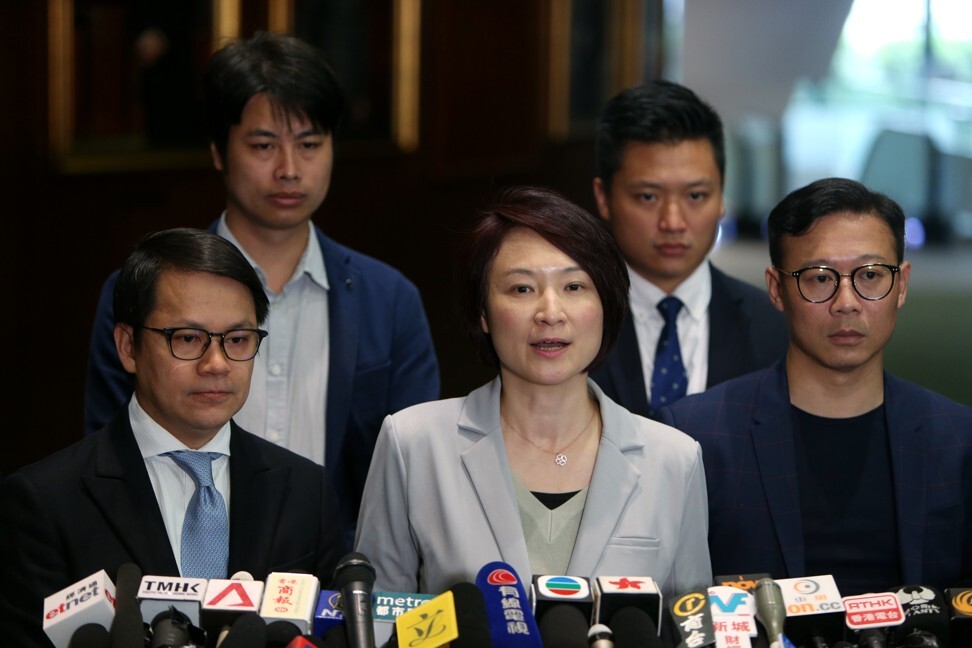
Former aide of Starry Lee, chairwoman of Hong Kong’s largest pro-establishment party, sentenced to eight months in jail for bribing voters with ‘lucky bags’
- Wong Wai-ha, 54, and her co-defendant were sentenced on Wednesday for conspiring to offer an advantage to others ahead of a Legco by-election in 2018
- The pair offered Sham Shui Po residents freebies if they voted for the DAB candidate

A former assistant to the chairwoman of Hong Kong’s largest pro-establishment party has been jailed for eight months for bribing voters to back its candidate in a Legislative Council by-election three years ago.
Wong Wai-ha’s application for bail pending an appeal was also rejected during Wednesday’s sentencing at West Kowloon Court, with the presiding magistrate describing the evidence against the 54-year-old defendant as “irrefutable”.
Wong, who at the time of the offence was an assistant of Starry Lee Wai-king, the chairwoman of the Democratic Alliance for the Betterment and Progress of Hong Kong (DAB), was found guilty earlier this month along with co-defendant Deng Yimei of conspiring to offer an advantage to others at an election.

Deng, a 44-year-old housewife from mainland China, was handed the same jail sentence on Wednesday after pleading for leniency based on her limited understanding of democracy.
The pair were found to have plotted the bribery scheme by offering “lucky bags” to residents of a Sham Shui Po public housing estate in an attempt to induce them to vote for candidate Vincent Cheng Wing-shun, who was representing the DAB in a March 11, 2018 poll.
The trial in November last year heard that between February 28 and March 5, 2018, Deng sent WhatsApp messages to at least seven residents of Hoi Lai Estate in Sham Shui Po, saying they would be given HK$100 (US$13) worth of food and household items if they voted for Cheng.
Investigators from the Independent Commission Against Corruption later found Wong had instructed Deng on March 4 to provide her with a list of residents from the estate along with their voting preferences.
The two accused claimed they had collected the personal information of their neighbours in order to provide benefits to them in the future and compiled their voting intentions out of curiosity.
But deputy magistrate Peter Hui Shiu-keung found the duo’s intention to entice residents to vote for Cheng was clearly reflected in telephone messages, in which the two repeatedly stated that voting for the DAB hopeful could be rewarded.
Hui previously acquitted two other defendants accused of taking bribes after finding insufficient evidence they had voted for Cheng because of the lucky bags.
In mitigation, defence lawyers urged the court to suspend the convicted pair’s jail sentences, saying the offending was far less serious than seen in previous cases.
Wong’s lawyer, Vod Chan Ka-sing, said his client deserved leniency because she was battling breast cancer and as a volunteer of a residents’ group on the estate had contributed significantly to her neighbourhood.
Kay Chan Kwok-wai, for Deng, said his client was unfamiliar with Hong Kong’s democratic system, having lived in the Guangxi region until moving to the city in 2011.
“There was no democratic election in her hometown ... She did not have a thorough understanding of democracy,” the lawyer said.
But Hui said a deterrent sentence was necessary in cases involving election fraud to preserve electoral integrity and the public’s confidence in the democratic process, adding neither defendants were sorry for their offending.
Despite the relatively small level of reward offered by the accused, Hui said the present case was in a way more serious than that of former champion horse trainer Brian Kan Ping-chee, who was jailed for a year over a HK$130,000 bribery scheme in a 2011 village representative election, because it involved a poll for the legislature.
“The result of a Legislative Council by-election can impact the entire Hong Kong, if not wider,” the magistrate. “The defendants assumed the role of a campaigner and offered advantages to multiple eligible voters. Bribery in elections warrants immediate imprisonment.”
Court of Appeal sentencing guidelines stipulate that a voter who engages in illegal election practices should be jailed for at least two months, a term doubling for candidates or campaigners.
The period of imprisonment could be even longer if bribes are involved.
The 2018 by-election was held following the ousting of localist lawmaker Regine Yau Wai-ching, one of six opposition politicians disqualified for improper oath-taking in 2016.
Cheng ultimately defeated pan-democrat Edward Yiu Chung-yim and independent Jonathan Tsoi Tung-chau, winning 107,479 votes to Yiu’s 105,060.